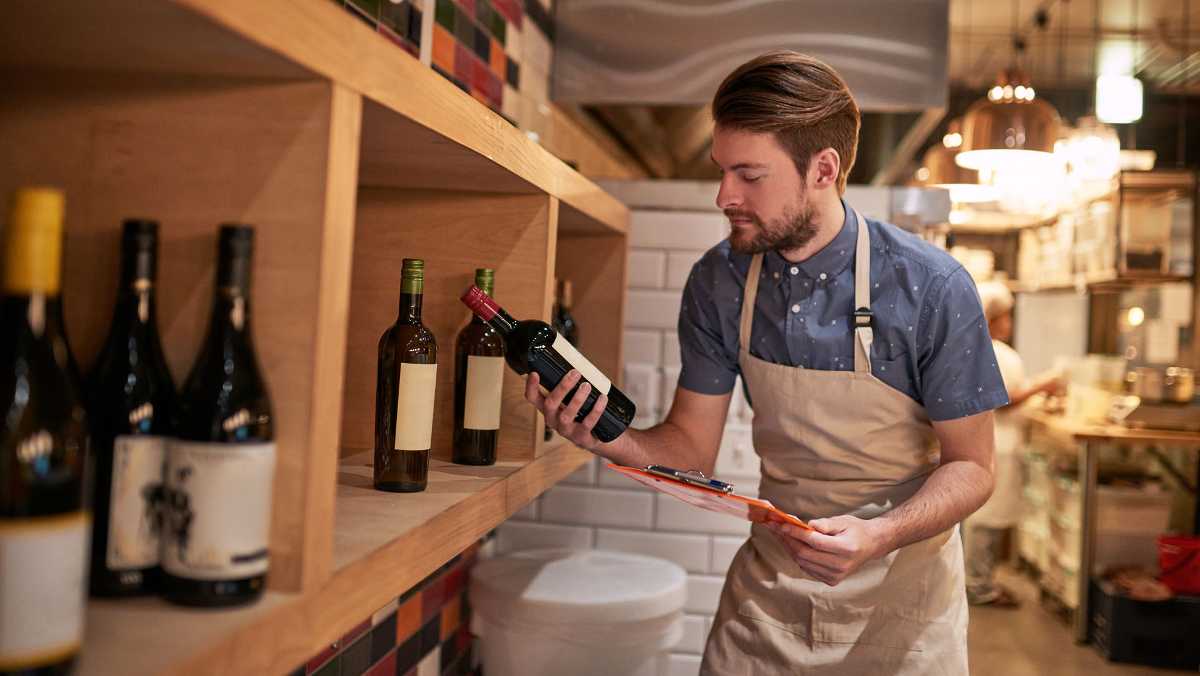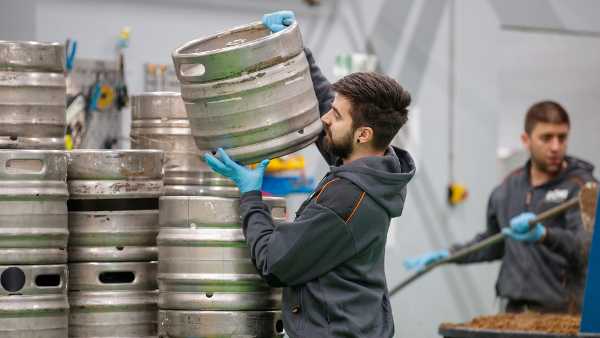Importing beer or wine

- Marcel Hoebink
- The basis
- Edited 26 November 2025
- 10 min
- Managing and growing
- International
Suppose you discover a delicious wine or tasty beer abroad. And you see opportunities for this product on the Dutch market. There are rules for importing food. About food safety, for example. And you pay excise duty, a national tax on alcoholic beverages.
In this article, you will read what product requirements there are for beer and wine. And how to pay excise duty and VAT on import. Do you import from countries outside the EU? Then you sometimes have to pay import duties.
Product requirements
Beer and wine have to comply with European food legislation. This law pays special attention to traceability. It is important to know where your beer or wine comes from and to whom you supplied it. This way, you quickly remove unsafe products from the market. As an importer, you need to register as a food (in Dutch) with the Netherlands Food and Consumer Product Safety Authority (NVWA).
The article on Importing food & beverage products lists the general requirements for all food & beverage products. For example, hygiene legislation and the presence of harmful substances. If your products are found to be unsafe, you have a duty to report (in Dutch) them to the NVWA.
Food & beverage hygiene
If you produce, process, transport, distribute, or store beer or wine, you are required to have a food safety plan. This is stated in the European food & beverage hygiene legislation. This plan outlines how your company ensures that all food & beverages are handled safely and how you comply with HACCP principles. HACCP is short for Hazard Analysis Critical Control Points. The HACCP system maps out everything that can go wrong with food & beverages and how to prevent this.
Several trade associations have a 'hygiene code'. This is a guide to help you create a food safety plan. The trade association for Dutch Wholesalers of Beverages and Catering Supplies (in Dutch), for example, has its own hygiene code. The Royal Association of Dutch Wine Merchants (KVNW) has developed a hygiene code for the wine sector (in Dutch).
Labelling
The marketing of prepackaged food intended for final consumers is subject to rules for labelling. Labels must contain ingredients and a best-before date. For a detailed explanation of your legal obligations with regard to labelling pre-packaged food & beverages, download the Food Labelling Handbook (in Dutch) created by the NVWA.
The Netherlands Enterprise Agency RVO provides information on labelling rules for wine. On the website of Brancheorganisatie Nederlandse Brouwers you will find information on the labelling rules for beer (in Dutch).
Please note: rules also apply on bottle type. And for bottle closures for certain types of wine.
Organic beer or wine
Importers of organic beer or wine have to meet additional requirements. For example, you need an inspection certificate if you import organic beer or wine from a country outside the EU. This is called a Certificate of Inspection for import of products from organic production (COI). You do not need a COI if you import from Norway, Iceland, Liechtenstein, Switzerland, or Northern Ireland.
Product liability
Do you import beer or wine from countries outside the European Economic Area (EEA) and Northern Ireland? Or do you purchase beer or wine from a EEA country or Northern Ireland and sell it under your own brand name? If so, you are liable for damage caused by a defect in the products. Make sure your beer and wine meet the requirements. You can take out product liability insurance.
Product requirements and import procedures
Access2Markets has information on product requirements and import procedures for beer and wine. The video below explains how to use this system. You need the product name or HS code of your product. The HS code is a six-digit commodity code used by customs to classify products.
Do you want to import malt beer? The HS codes for this start with 2203. In that case, enter 2203 in the ‘Product name or HS code’ field. Enter 2204 if you want to import wine from fresh grapes. For non-alcoholic beer, enter 220291. For vermouth and other wine made from fresh grapes prepared with aromatic plants or aromatic substances 2205. And for cider and perry 220600.
Video: Want to know the rules when importing? Use Access2Markets
Branded products and parallel imports
Importing branded products outside the official distribution channels is called parallel import. For example, you buy a branded article from a foreign intermediary. And not from the official foreign manufacturer or official importer.
Do you want to import an original brand of beer or wine via parallel import from a country outside the EEA? This is only allowed with the consent of the trademark owner. The trademark owner has the right to be the first to put a product on the EEA market. The trademark holder is usually the official manufacturer.
Once a product has been put on the market for the first time within the EEA by the trademark owner? Or with his consent by another person? Then it is thereafter freely marketable within the EEA. You may buy the branded product from another EEA member state via parallel import from then on.
Please note that importing and trading counterfeit products is a criminal offence.
Importing goods from EU countries
There is free movement of goods in the EU, which means that you do not have to pay import duties when importing beer or wine from another EU member state. You will not have to declare the goods to Dutch Customs either, but they are subject to VAT and excise duty.
Special situation Northern Ireland
Northern Ireland is part of the United Kingdom. But since the Brexit, it follows EU rules for trade and customs. This means you do not pay import duties and do not have to file a customs declaration if you import goods from Northern Ireland. VAT and excise rules for imports from EU countries also apply to imports from Northern Ireland.
VAT on beer
Your beer supplier in the other EU country will usually charge 0% VAT. Pass on your VAT identification number to your supplier. Add Dutch VAT to the purchase and report it in your VAT return. You will usually be allowed to deduct it as input tax in the same return. The Dutch VAT rate for beer is 21%. For beer with 0.5% alcohol or less, the VAT rate is 9%.
VAT on wine
If you buy wine from an entrepreneur in another EU country, they will usually charge 0% VAT, provided they have your VAT identification number. Add Dutch VAT to the purchase and declare the VAT in your own VAT return. You will usually be allowed to deduct it as input tax in the same return. The Dutch VAT rate for wine is 21%.
Excise duty
Excise duty is a national tax on excise goods such as alcoholic beverages, mineral oils, and tobacco products. Each EU country has its own excise duty rates. If you import beer, you pay excise duty based on the extract content or plato content of beer rather than its alcohol content. The excise duty rate for wines is linked to alcohol content. Alcohol-free beer, low-alcohol beer containing 0.5% or less alcohol, and other beverages containing up to 1.2% alcohol are not excise goods. For these products, you pay consumption (verbruiksbelasting, in Dutch) instead of excise duty. There are different rates for excise duty and consumption tax.
There are two ways to receive excise goods from another EU country:
1. Excise duty already paid in EU country of origin
Sometimes suppliers have already paid excise duty in their own country. Goods on which suppliers have paid excise duty in their country are called 'excisable goods'. Your supplier needs a 'licence certified consignor' (vergunning gecertificeerde afzender) to ship excisable goods. As receiver, the consignee, you also need a permit:
- Do you regularly expect shipments of excisable goods? Then you need a 'Permit Certified Consignee' (vergunning gecertificeerde geadresseerde).
- Do you receive occasional shipments? Then you need a 'Licence registered consignee (temporary)' (Vergunning geregistreerde geadresseerde (tijdelijk)).
To transport excisable goods, you need an electronic simplified administrative document (e-VAD) from your supplier. You pay Dutch excise duty through an online declaration no later than one working day after receiving the goods. Dutch Customs provides more information on receiving excise goods (in Dutch) from another EU country.
To transport excisable goods, you need an electronic simplified administrative document (e-VAD) from your supplier. You pay Dutch excise duty via an online declaration no later than one working day after receiving the goods. Dutch Customs provides more information on excisable goods received from another EU country.
2. Excise duty not paid in EU country of origin
Has your supplier not yet paid excise duty in their own country? Then you will receive the excise goods ‘in duty suspension’ (onder schorsing van accijns). This is only possible if your supplier delivers the goods from a tax warehouse or has a Registered Consignor Permit. As a receiver, you also need a permit:
- If you expect to regularly receive excise goods from other EU countries, you will need a ‘Registered Consignee Permit’,
- While a ‘Registered Consignee Permit (temporary)’ will suffice if you only expect to receive excise goods occasionally.
To move excise goods, you need an electronic administrative (e-AD, in Dutch) from your supplier. Have you received the goods? Then you pay Dutch excise duty via an online declaration. You do this no later than the Friday following the week of receipt. For more information, visit the website of Dutch Customs (in Dutch).
Part-time wine importer: a holiday dream come true
Erik Hobé had been considering starting his own business for years, until an inspiring holiday finally encouraged him to take the plunge. He sought advice about excise duty rules and registered his company Wine to Service with KVK. Hobé imports a variety of wines from Germany. “At a wine fair in Düsseldorf next year, I want to see if I can start new collaborations with interesting, small wineries.”
Importing goods from non-EU countries
When you import beer or wine from a non-EU country, you have to declare goods to Dutch Customs. Your carrier or customs broker will usually file this import declaration on your behalf. Often they will advance any import duties and VAT that may be due. You will also need an EORI number when dealing with Dutch Customs.
Import duties on beer
For malt beer with more than 0.5% alcohol, you pay no import duty. For alcohol-free beer or low-alcohol beer containing up to 0.5% alcohol, an import duty of 9.6% applies. You pay import duties on the customs value. This is your purchase price of the alcohol-free or low-alcohol beer plus transport and insurance costs up to the EU border or port of entry.
Import duties on wine
If you import wine from a non-EU country, you pay import duties based on the quantity in hectolitres. The import duty rate is linked to the ten-digit commodity code of the wine. The commodity code of wine from fresh grapes begins with 2204, while vermouth and other wine made from fresh grapes prepared with aromatic plants or with aromatic substances has a different commodity code, beginning with 2205. The commodity code of cider and perry/pear wine begins with 220600.
Reduced or no import duties
Do you import wine, non-alcoholic or low-alcoholic beer from countries the EU has a trade agreement or special arrangement with? Then you usually pay less or no import duties. You will then need a preferential certificate or declaration of origin from that country.
VAT on beer
When you import beer into the Netherlands, you pay Dutch VAT. You are allowed to deduct this VAT as input tax in your VAT return if you are entitled to deduct VAT. Do you regularly import goods? You can apply for an article 23 permit from the Dutch Tas Administration to avoid having to pay for VAT at the time of import. Instead, you can file the VAT with your VAT return, which will benefit your liquidity.
The Dutch VAT rate for beer is 21%. For beer with 0.5% alcohol or less, the VAT rate is 9%.
VAT on wine
When you import wine into the Netherlands, you pay Dutch import VAT. As with beer, you are allowed to deduct this VAT as input tax in your VAT return if you are entitled to deduct VAT. If you regularly import products, the Dutch tax authorities may issue you an article 23 permit which exempts you from having to pay import VAT. The Dutch VAT rate for wine is 21%.
Excise duty
Do you import wine or beer from countries outside the EU? Then you pay excise duty. As with imports within the EU, you can receive excise goods suspended. To receive suspended excise goods, you need a Sender's Licence and an Excise Warehouse Licence (vergunning accijnsgoederenplaats, AGP). As a registered consignor (sender), you may transport suspended excise goods to your AGP. You then pay excise duty only when you take the goods out of your AGP.
Alcohol-free beer, low-alcohol beer with 0.5% or less alcohol and other drinks with no more than 1.2% alcohol are not excise goods. For these products you pay consumption (verbruiksbelasting, in Dutch) instead of excise duty.
VI-1 document for wine
To import wine from countries outside the EU, you need a certificate and analysis report. This is called a VI-1 (in Dutch). The V I-1 document is required only for wine from fresh grapes with TARIC codes starting with 2204. The EU has appointed to issue these V I-1 documents. Do the wine products come from Australia, Chile, Canada or the United States? Then an easier procedure is possible. Wine producers from these countries are allowed to issue VI-1 documents themselves. But they must then have permission from the official authorities in their countries.
For wine products originating in Switzerland, you do not use a VI-1 document, but an accompanying . When importing wine produced in the UK, a certificate of self-certification instead of the VI-1 document is possible. This is stated in the trade agreement with the United . Such certificate must comply with the rules set out in Annex 15, Article 3(1), and Annex 15-C of the agreement. Do you import wine produced in Japan? If so, a 'simplified VI-1 certificate' is required. Or a 'simplified VI-1 certificate of self-certification' from a Japanese wine producer authorised to do so by the country's designated authority.
Assistance with excise duty declaration and storage
Do you lack licences and prefer to outsource excise duty declaration or storage? Then engage a logistics service provider. For example, a customs agent specialised in excise goods.
Would you like to store products under excise duty suspension yourself? Then you need an Excise Warehouse Licence (AGP). The permit requires you to store a minimum of 40,000 litres of beer or 10,000 litres of wine. These quantities may be lower if you move excise goods directly to other member states to a significant extent. You can read more about this in the information sheet (in Dutch).
Import step-by-step plan
You can start importing successfully if you have sufficient knowledge of the import process. The Import step-by-step plan will guide you through the entire import process in 14 steps. From market research to concluding a contract.
Wine vinegar
Do you import wine from inside or outside the EU intended for the production of other foodstuffs? For example, wine vinegar or wine in cheese fondue? You may qualify for an exemption from excise duty under certain conditions. This exemption also applies to other excise products that you use for other foods, such as rum in chocolates.


